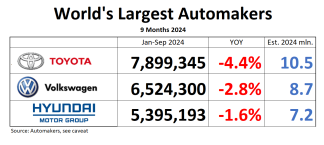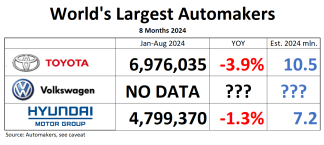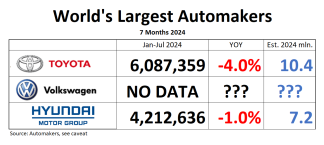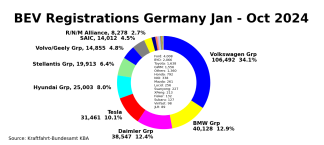Of all the automotive sector topics covered by the business media, defect recalls are consistently one of the most tricky to cover. Most defects are the inevitable products of immensely complex supply chains and constant price pressure, and recalls for them are ultimately a sign of a company responding to the problem. And with some 22 million vehicles recalled from the US market in 2013, consumers can hardly be expected to know which ones represent grounds for real concern.
Because automakers control all the information about the products they make, reporters on the automotive safety beat have little choice but rely on the company line for their stories. Only the threat of investigation by the National Highway Transit Safety Administration compels automakers to fully reveal their dirty laundry, and only NHTSA’s complaint database gives the public an opportunity to compare their experiences with the company line. No wonder the first real auto safety journalist (and the inspiration for NHTSA’s founding) was a lawyer.
NHTSA was created in 1970, in response to a growing public and media interest in auto safety following the publication of Ralph Nader’s 1965 book Unsafe At Any Speed. Huge advances in safety technology in the meantime have made cars far safer, but quality gremlins with potentially lethal consequences for the public remain. Unfortunately, the cascades of four- and five-star crash ratings seem to have lulled the media into forgetting their very real responsibilities; once again, the public interest appears to be in the hands of lawyers.
The latest example comes (via USA Today) from the lawyers who sued GM in Melton vs. General Motors et al., over the death of a Georgia pediatric nurse who lost control of her 2005 Chevrolet Cobalt on her 29th birthday, in 2010. GM settled that lawsuit out of court, but recalled the same vehicle in February 2014, for a defective ignition switch. Testimony from the case shows GM knew about the problem before the car launched, and that its “fix” sent to dealers and mechanics was merely an “improvement.”
Worse still, after GM’s February recall USA Today showed that not all the vehicles using the problematic switch had been recalled. The very next day, GM widened its recall and doubled the number of deaths it publicly tied to the ignition defect. But as if to disabuse readers of the notion that this victory belonged to journalism, USA Today lets “Lance Cooper, attorney for the estate of Brooke Melton,” do the gloating, clearly indicating where the legwork had been done in the case.
To be sure, both Cooper and the reporters of USA Today should be heartily congratulated for exceeding both the automotive-beat media and the government’s watchdog in the pursuit of the public interest. Indeed, were it not for their pressure it’s not at all clear that NHTSA would take this defect, which turns off the car’s engine and disables its airbags, seriously at all.
This situation stands in stark contrast to the last major recall related to loss of control: the Toyota firestorm of 2009-2010, when government officials urged on a media frenzy and eventual congressional hearing over a supposed un-recalled electronic problem with Toyotas that failed to materialize after extensive investigation. Secretary of Transportation Ray LaHood had to retract his initial comments encouraging the public “stop driving” Toyotas, but continued to play up the possibility of electronic defects and boasted that his agency was “holding Toyota’s feet to the fire.” Like the GM story, the Toyota scandal was driven by lawyers, indicating that relying on injury lawyers to drive public good makes for uneven public policy at best.
Considering the media and government panic around Toyota amounted to a digital ghost hunt, the contrast with NHTSA’s apparent disinterest in GM’s decade-late recall of a known and deadly defect is troubling. In the context of recent government investment in GM, it suggests the possibility of a regulatory double standard that would unfairly tilt the playing field towards a government-backed business… and put the American public in harm’s way in the process. That shocking possibility is not without precedent: the government allowed both GM and Chrysler to shed liability and Lemon Law litigation during the bailout, putting the success of bailed-out automakers ahead of plaintiffs and victims who had not had their day in court.
It’s crucial to remember in discussions about automotive safety that driving continues to be one of the most dangerous activities Americans regularly engage in, responsible for killing more than 30,000 Americans each year, even at recent historically low levels. Ultimately, we take our lives in our own hands whenever we get behind the wheel, but we also trust that our car will not suddenly turn itself off or leave us unable to protect ourselves. And failing that, we trust that media and NHTSA (without which, the media is largely helpless) will force recalls of any defects that might result in such a horrifying scenario.
Unfortunately, at the moment it’s not easy to argue that this trust is well-earned. GM’s timeline letter to NHTSA [PDF here] shows the safety regulator has known since Monday that GM has known about this “reproducible” defect since 2004. The letter shows GM proposed a simple fix in 2005: replace the key’s slot-shaped ring hole with a round one. It also shows that the proposal was rejected until 2009, when it was approved but not applied to cars on the road through a recall… and even then, the Cobalt’s Chief Engineer, Gary Altman, ultimately admitted under oath that this modification was an “improvement” not a “fix.” Fully aware that a recall wasn’t issued for this defect until this year, NHTSA now says it will merely “monitor consumer outreach as the recall process continues and will take appropriate action as warranted.”
At the point that lawyers are dragging this story to the media and forcing NHTSA to even acknowledge it, it’s clear that something has gone horribly wrong with the US auto safety system. If the Toyota panic deserved a congressional hearing, this situation certainly does too.
UPDATE: David Shepardson of the Detroit News tweets that NHTSA has opened an investigation “to determine if GM recall of 1.62M cars was timely and if GM ‘followed the legal processes and requirements for reporting recalls'”






